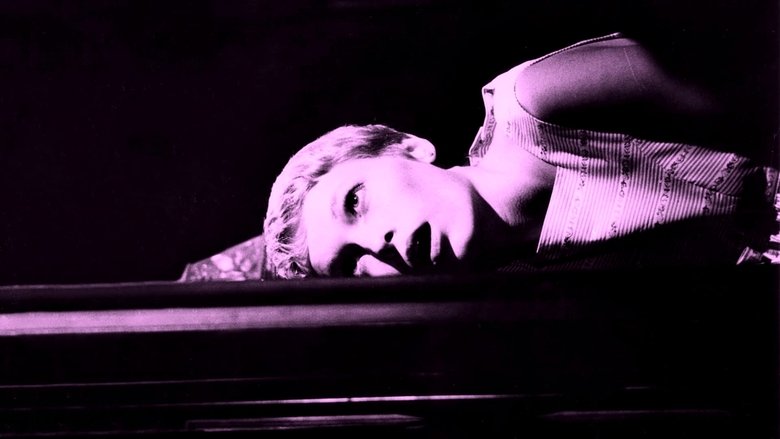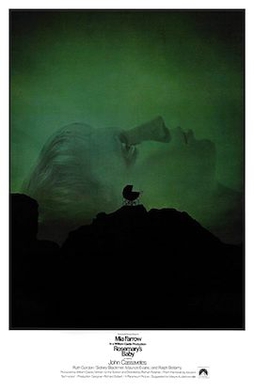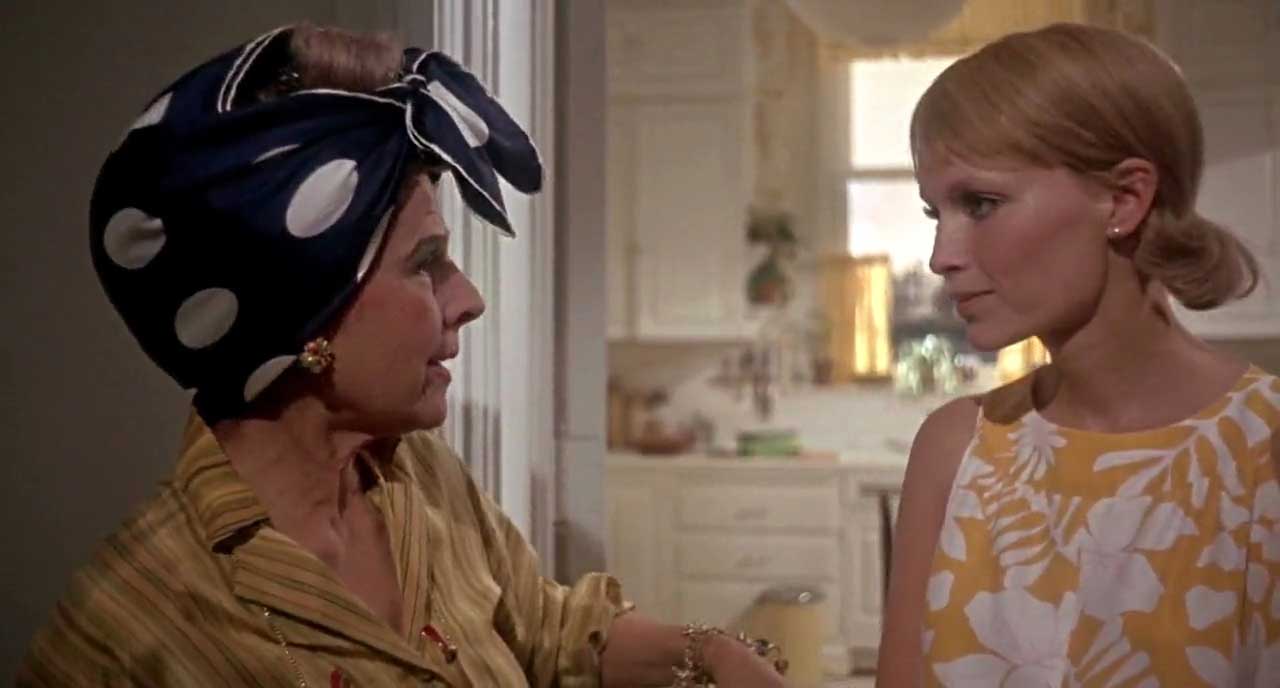← Back to Reviews

in
ROSEMARY'S BABY

My recent viewing of Roman Polanski's masterpiece Chinatown motivated me to actually do something I have been trying to do for about 35 years: I have finally watched Polanski's 1968 classic Rosemary's Baby from opening credits to closing credits, something which I have attempted to do dozens of times over the years and finally did today. It's so awesome when a classic lives up to its reputation and this one did, even some 50 years after its original release, thanks to its director, Roman Polanski.

Based on a novel by Ira Levin, this is the story of Rosemary and Guy Woodhouse, a young New York couple who move into one of those old gothic looking brownstones and begin refurbishing the place. Guy is a struggling actor and Rosemary's only priority seems to be having a child. Around the same time Rosemary becomes pregnant, the Woodhouses are befriended by an elderly couple named Minnie and Roman Castavet, who take an inordinate interest in Guy and Rosemary, or more specifically, in Rosemary and her pregnancy...Minnie immediately starts making health drinks for Rosemary and arranges a new doctor for her, but it soon becomes apparent to Rosemary that the Castavets have a hidden agenda and just when they are are about to be exposed by Rosemary's old friend Hutch, Hutch conveniently ends up dead.

As a writer and director, Roman Polanski proved himself an artist where cinematic storytelling is concerned. Polanski has enough trust in the material and in the payoff that this story eventually provides that he allows this story to unfold very slowly and this is one of the few times that this really works to maximum effect....we're at least 20 minutes into the film before we even get a hint of what is happening here and it is just a hint, noting more...there are red herrings here and there and there are a few things that happen in the story that I didn't understand, but it didn't stop me from becoming completely enveloped in one of the most compelling, terrifying, and heartbreaking stories I have ever seen. Chills are definitely in order when what is happening here starts to come into focus and we hope that we're wrong because this story is centered around one of the most instantly likable movie heroines I have ever seen. We're concerned for her but, through Polanski's screenplay, we learn that the character's outward appearance of fragility cannot be mistaken for stupidity...this character is sharper than she appears on the surface and even though she may not act on it, she really doesn't miss much. I especially love act two, where Rosemary begins to realize Roman and Minnie are not all they appear and that there's something wrong with those health drinks, as she begins pouring the drinks down the drain and planning parties where the Castavets are not on the guest list.

Polanski's hand-picked cast deliver the goods, starting with Mia Farrow, in the performance that made her a movie star...Farrow's Rosemary is an uncanny combination of china doll fragility and self-preservation beast. Normally, in a story like this, the heroine gives up at some point but Rosemary never does, even though her initial naivete seems a little affected at times, we love this woman from the opening frames and want her to have everything she wants. Polanski made a real offbeat choice in the casting of John Cassavetes as Guy...on paper, Guy seems like he would have been played with someone more movie-star-looking like Warren Beatty or Robert Redford, but his unconventional acting choices make Guy a much more interesting character than he is in the script and somehow manages to keep Guy slightly likable. Ruth Gordon's scene-stealing antics as the annoying and creepy Minnie Castavet won her the Oscar for Best Supporting Actress. Mention should also be made of Sidney Blackmer as Roman Castavet, Maurice Evans as Hutch, Ralph Bellamy as Minnie's creepy doctor and a very young Charles Grodin as Rosemary's real doctor. It should be mentioned that this film was made during a time of great personal turmoil for the director and his star...Polanski's relationship with Sharon Tate was about to be ended by her brutal murder and Farrow was nearing the end of her crumbling marriage to Frank Sinatra...Sinatra wanted Mia home barefoot and pregnant and Mia was not having that...she got this movie and her marriage was pretty much over by the time it was released.

But what this film has above everything else is the gothic and chilling atmosphere that director Polanski creates through some imaginative camerawork and striking cinematic pictures that spark such frightening imagery that, like the central character, we find ourselves from time to time wondering if this is really happening or if it's all just a psychotropic nightmare and that , I think, was Polanski's intent.

My recent viewing of Roman Polanski's masterpiece Chinatown motivated me to actually do something I have been trying to do for about 35 years: I have finally watched Polanski's 1968 classic Rosemary's Baby from opening credits to closing credits, something which I have attempted to do dozens of times over the years and finally did today. It's so awesome when a classic lives up to its reputation and this one did, even some 50 years after its original release, thanks to its director, Roman Polanski.

Based on a novel by Ira Levin, this is the story of Rosemary and Guy Woodhouse, a young New York couple who move into one of those old gothic looking brownstones and begin refurbishing the place. Guy is a struggling actor and Rosemary's only priority seems to be having a child. Around the same time Rosemary becomes pregnant, the Woodhouses are befriended by an elderly couple named Minnie and Roman Castavet, who take an inordinate interest in Guy and Rosemary, or more specifically, in Rosemary and her pregnancy...Minnie immediately starts making health drinks for Rosemary and arranges a new doctor for her, but it soon becomes apparent to Rosemary that the Castavets have a hidden agenda and just when they are are about to be exposed by Rosemary's old friend Hutch, Hutch conveniently ends up dead.

As a writer and director, Roman Polanski proved himself an artist where cinematic storytelling is concerned. Polanski has enough trust in the material and in the payoff that this story eventually provides that he allows this story to unfold very slowly and this is one of the few times that this really works to maximum effect....we're at least 20 minutes into the film before we even get a hint of what is happening here and it is just a hint, noting more...there are red herrings here and there and there are a few things that happen in the story that I didn't understand, but it didn't stop me from becoming completely enveloped in one of the most compelling, terrifying, and heartbreaking stories I have ever seen. Chills are definitely in order when what is happening here starts to come into focus and we hope that we're wrong because this story is centered around one of the most instantly likable movie heroines I have ever seen. We're concerned for her but, through Polanski's screenplay, we learn that the character's outward appearance of fragility cannot be mistaken for stupidity...this character is sharper than she appears on the surface and even though she may not act on it, she really doesn't miss much. I especially love act two, where Rosemary begins to realize Roman and Minnie are not all they appear and that there's something wrong with those health drinks, as she begins pouring the drinks down the drain and planning parties where the Castavets are not on the guest list.

Polanski's hand-picked cast deliver the goods, starting with Mia Farrow, in the performance that made her a movie star...Farrow's Rosemary is an uncanny combination of china doll fragility and self-preservation beast. Normally, in a story like this, the heroine gives up at some point but Rosemary never does, even though her initial naivete seems a little affected at times, we love this woman from the opening frames and want her to have everything she wants. Polanski made a real offbeat choice in the casting of John Cassavetes as Guy...on paper, Guy seems like he would have been played with someone more movie-star-looking like Warren Beatty or Robert Redford, but his unconventional acting choices make Guy a much more interesting character than he is in the script and somehow manages to keep Guy slightly likable. Ruth Gordon's scene-stealing antics as the annoying and creepy Minnie Castavet won her the Oscar for Best Supporting Actress. Mention should also be made of Sidney Blackmer as Roman Castavet, Maurice Evans as Hutch, Ralph Bellamy as Minnie's creepy doctor and a very young Charles Grodin as Rosemary's real doctor. It should be mentioned that this film was made during a time of great personal turmoil for the director and his star...Polanski's relationship with Sharon Tate was about to be ended by her brutal murder and Farrow was nearing the end of her crumbling marriage to Frank Sinatra...Sinatra wanted Mia home barefoot and pregnant and Mia was not having that...she got this movie and her marriage was pretty much over by the time it was released.

But what this film has above everything else is the gothic and chilling atmosphere that director Polanski creates through some imaginative camerawork and striking cinematic pictures that spark such frightening imagery that, like the central character, we find ourselves from time to time wondering if this is really happening or if it's all just a psychotropic nightmare and that , I think, was Polanski's intent.
